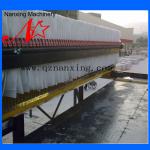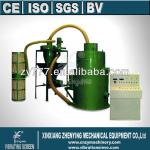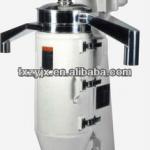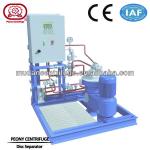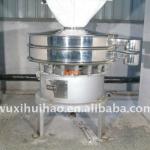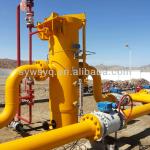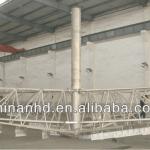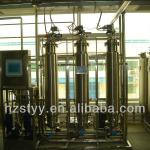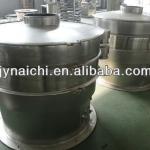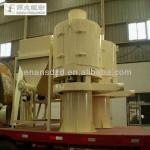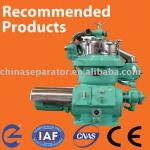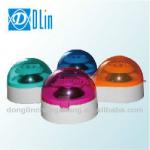SS200 Mini Laboratory Centrifuge Separator
| Condition:New | Type:Centrifuge | Product Type:S.S316L | Place of Origin:Liaoning China (Mainland) |
| Brand Name:ZL | Model Number:SS200 | Voltage:220 | Power(W):0.37 |
| Weight:30kg | Dimension(L*W*H):400*400*600mm | Certification:ISO | Warranty:1year |
| After-sales Service Provided:Overseas service center available | Bowl diameter:200mm | Bowl volume:3L | Max. loading:2kg |
| Speed:3000 r/min |
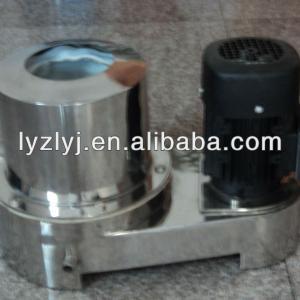
SS200 Laboratory Centrifuge Separator
It is an universal centrifuge for all application of solid-liquid separation by filtration. Offered in a variety
of materials of construction like-austenitic steels, PVDF coated-mild steels etc. They are manufactured
with the best technology in the field and gives long trouble free operational lite. These are offered in
various models and known as Chemical Centrifuge & Vertical Centrifuge.
Basket centrifuges are often called centrifugal filters or clarifiers. They have a perforated wall and cylindrical
tubular rotor. In many cases the outer wall of a basket centrifuge consists of a fine mesh screen or a series
of screens with the finer mesh screens supported by the heavier coarse screen, which in turn is supported by
the bowl.
How a Basket Centrifuge Works
The solid wall basket centrifuge uses centrifugal force to promote liquid/solid separation. The feed slurry is
introduced into the rotating basket and is accelerated to the basket speed. Solids/contaminants are pulled radially
away from the liquid by centrifugal force and collects along the inner wall of the basket. The clarified liquid builds
up along in the inside and flows up and over the basket wall. It collects along the inside of the housing and is
discharged by gravity through the outlet. Liquid clarification continues until the basket can no longer retain any
solids and must be emptied. Automatic and semi-automatic solids discharge is available for suitable solids
consistency.
A laboratory centrifuge is a piece of laboratory equipment, driven by a motor, which spins liquid samples
at high speed. There are various types of centrifuges, depending on the size and the sample capacity.
Like all other centrifuges, laboratory centrifuges work by the sedimentation principle, where the centripetal
acceleration is used to separate substances of greater and lesser density.
There are various types of centrifugation:
Differential centrifugation, often used to separate certain organelles from whole cells for further analysis
of specific parts of cells
Isopycnic centrifugation, often used to isolate nucleic acids such as DNA
Sucrose gradient centrifugation, often used to purify enveloped viruses and ribosomes, and also to separate
cell organelles from crude cellular extracts
There are different types of laboratory centrifuges:
Microcentrifuges
(devices for small tubes from 0.2 ml to 2.0 ml (micro tubes), up to 96 well-plates, compact design, small
footprint; up to 30,000 g)
Clinical centrifuges
(devices used for clinical applications like blood collection tubes, low-speed devices)
Multipurpose benchtop centrifuges
(devices for a broad range of tube sizes, high variability, big footprint)
Stand alone centrifuges
(heavy devices like the ultracentrifuge)
Centrifuge tubes
Centrifuge tubes or centrifuge tips are tapered tubes of various sizes made of glass or plastic. They may
vary in capacity from tens of millilitres, to much smaller capacities used in microcentrifuges used extensively
in molecular biology laboratories. The most commonly encountered tubes are of about the size and shape of
a normal test tube (~ 10 cm long). Microcentrifuges typically accommodate microcentrifuge tubes with
capacities from 250 μl to 2.0 ml. These are exclusively made of plastic.
Glass centrifuge tubes can be used with most solvents, but tend to be more expensive. They can be cleaned
like other laboratory glassware, and can be sterilized by autoclaving. Plastic centrifuge tubes, especially
microcentrifuge tubes tend to be less expensive. Water is preferred when plastic centrifuge tubes are used.
They are more difficult to clean thoroughly, and are usually inexpensive enough to be considered disposable.
Centrifuges from our company including
Tubular centrifuge
Disc centrifuge
Basket centrifuge
Peeler centrifuge
Push centrifuge proteins centrifuge
silicate centrifuge
cell fraction centrifuge
antibiotics centrifuge
bacteria centrifuge
naphtholate centrifuge
bio-fuel centrifuge
biomass harvesting centrifuge
bioremediation centrifuge
blood fractionation centrifuge
brewer's yeasts centrifuge
brine sludge centrifuge
calcium carbonate centrifuge
calcium sulphate centrifuge
chromium hydroxide centrifuge
cocoa centrifuge
cryoglobulin centrifuge
cutting oil centrifuge
dicalcium phosphate centrifuge
dye centrifuge
escherichia colielectroplating solutions centrifuge
enzyme centrifuge
ethanol stillage centrifuge
fat centrifuge
fermentation centrifuge
fish oils centrifuge
flavorings centrifuge
effluents centrifuge
fruit juice centrifuge
fungus centrifuge
gamma centrifuge
graphite centrifuge
nitrate centrifuge
gum centrifuge
herbal centrifuge
hydraulic oil centrifuge
ink centrifuge
insulin tissue centrifuge
iron oxide centrifuge
lactose centrifuge
nano centrifuge
paper mill effluent centrifuge
pathogens centrifuge
pharmaceuticals centrifuge
pigments centrifuge
polymers centrifuge
precious metals centrifuge
protein precipitate centrifuge
prothrombin centrifuge
refinery effluent centrifuge
salicylic acid centrifuge
sodium nitrite centrifuge
sodium sulphate centrifuge
spirillum centrifuge
spore collection centrifuge
tallow centrifuge
titanium dioxide centrifuge
varnish centrifuge
vegetable oil centrifuge
virus recovery centrifuge
wine clarification centrifuge
yeast centrifuge

| Packaging Detail:Standard wooden case |
| Delivery Detail:30 days |



